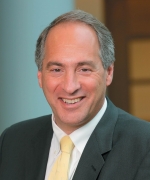AAI In Memoriam

Daniel Salomon
Scripps Research Institute Professor Daniel R. Salomon, M.D. (AAI ’11), a transplant immunologist, died of colon cancer last fall at the age of 63. The following Scripps remembrance, first published on the Scripps website on November 14, 2016, appears with that institute’s kind permission.
Daniel R. Salomon, a professor at The Scripps Research Institute (TSRI), passed away November 10 after battling his colon cancer for nearly two years. He was 63.
“Dan was a great colleague and a terrific human being,” said TSRI President Peter Schultz.
“Dan was the definition of a clinician-scientist and a gifted teacher and mentor,” said James Williamson, TSRI’s dean of graduate and postdoctoral studies and vice president for academic affairs. “In addition, he was a remarkable person—a theme reiterated by so many colleagues who knew him here at TSRI.”
After undergraduate studies at Northwestern University (1973), he received an M.D. from the Stritch-Loyola School of Medicine (1976). He did a medical residency at Cedars-Sinai Medical Center, University of California, Los Angeles, from 1976 to 1979, becoming chief medical resident in 1980. This training was followed by nephrology and transplantation immunology fellowships at the Brigham and Women’s Hospital, Harvard Medical School.
In 1984, Salomon became medical director of the Kidney and Heart Transplant Programs at the University of Florida. In 1990, he moved to the Laboratory of Immunology at the National Institutes of Health to concentrate on basic research in molecular immunology and transplantation. He arrived at TSRI in 1993, with a joint appointment at Scripps Health’s Scripps Green Hospital, where he became co-director of the Center for Organ and Cell Transplantation.
At TSRI, Salomon’s research focused on various aspects of transplantation and immunology with a primary focus on the functional genomics of human kidney, liver, and islet transplantation. One major goal was to discover biomarkers for the diagnosis of acute and chronic rejection, the management of immunosuppression, and prognostic markers for transplant outcomes. Another objective in functional genomics was to understand the multidimensionality of transcriptional regulation, including microRNA regulation and alternative splicing in lymphocyte activation. His lab also investigated islet xenotransplantation, the molecular virology of Porcine Endogenous Retrovirus, therapeutic angiogenesis, and applications of gene therapies to cell transplantation.
In a 2013 article on his work (
https://www.scripps.edu/newsandviews/e_20130603/salomon.html), Salomon said, “I’ve worked hard to link my medical interests to basic science, all the way down to cell biology and chemistry. TSRI’s science-focused, collaborative environment is perfect for that approach. Doing the best basic science possible and taking every opportunity created by good science and outstanding collaborators to translate the findings to a better understanding of health and disease is why I’m still here.”
Salomon published more than 127 manuscripts and 46 chapters, as well as edited three books. In addition,he recently served as president of the Society of Transplantation, as well as in leadership positions on the Regulatory Affairs Committee for the American Society of Gene Therapy; National Institutes of Health (NIH) Islet Cell Resources Steering Committee; NIH Genomics of Transplantation Cooperative Research Program Steering Committee; and Biological Response Modifiers Advisory Committee for the U.S. Food and Drug Administration. Williamson relates, “Dan was a truly wonderful friend, and many of us got to know him especially well through surfing. We spent countless hours in the water together over the last 10 years, discussing science and politics, and especially the politics of science. We actually got a major grant funded for a project that we conceived over the course of two years of discussions while surfing. Those sessions in the waters of North County really embodied how he viewed life: it was the quality time that counts. As we would depart, tired from a session, I would give him a hug and say, ‘Good to be with you!’ Yes, Dan, it was good to be with you…for all of us.”
Salomon is survived by his wife Lauren; his children Marc and Rennie; his mother; and four grandchildren. The family held a private memorial service.
******
In memory of Dr. Salomon, a former American Society of Transplantation (AST) president and Transplantation and Immunology Research Network co-founder, the Salomon family and the AST have partnered in the creation of the Frontiers in Transplantation Endowment (FITE).
Reflecting Dr. Salomon’s principal goal of improving the lives of those with end-stage organ disease by pushing the boundaries of current research, FITE will support a sustainable award that promotes translational science while advancing the type of transformative research for which he advocated. The award will foster high risk/high payoff science by supporting untested, potentially transformative research ideas or approaches that apply diverse expertise or that engage novel or interdisciplinary perspectives applicable to transplantation science.
Donations to FITE are being accepted on an ongoing basis through the Power2Save fundraising site, where gifts should be designated to the “Daniel R.Salomon Memorial Fund.” To donate, visit https://4agc.com/donation_pages/ecff99a5-dcc2-4492-bc79-2e8de94294ce.
To view the AST tribute to Dr. Salomon, visit https://www.myast.org/about-ast/presidents-blog/memoriam-daniel-r-salomon-md.